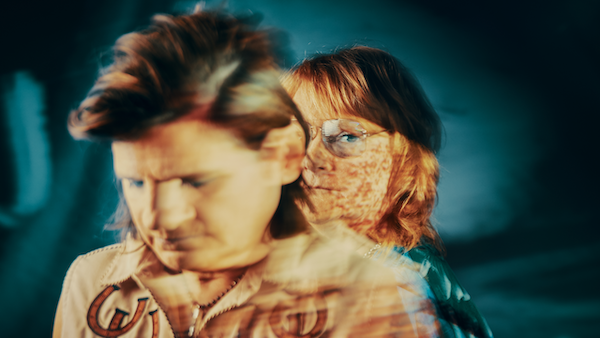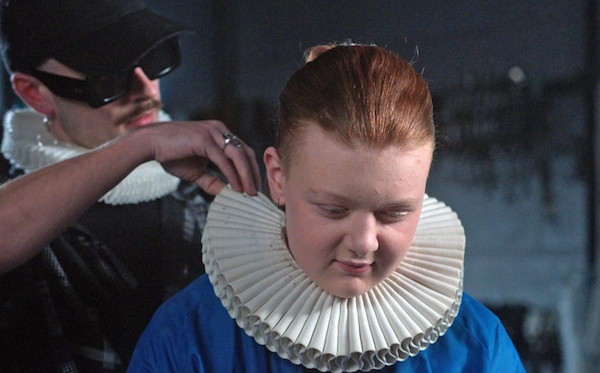Doc Talk: Outspoken and Proud at the Wicked Queer Doc Fest
By Peter Keough
As these two films at the Wicked Queer Doc Fest indicate, being non-heteronormative in a patriarchal society is unavoidably a political statement.

A scene from It’s Only Life After All. Photo: Tribeca
Take Emily Saliers of the Indigo Girls, back in the spotlight after their 1989 song “Closer to Fine” was featured on the Barbie soundtrack. In It’s Only Life After All (2023), Alexandria Bombach’s discursive but illuminating and affecting profile of the duo, Saliers explains how — until she was the victim of a gay bashing — she was resistant to declaring herself as gay. It was not anyone’s business, she thought.
But then she realized that doesn’t stop the ignorant, self-righteous, and bigoted from intruding on your privacy, violating your individual freedom and dignity, even threatening your life — especially when you are part of a highly popular, chart-busting, award-winning music group. “Once I made my mind up it was like, okay, this is what we are,” she recalls. Activism then seemed inevitable. The Indigo Girls would speak out not just for gay causes but environmentalism, freedom of choice, and civil rights.
For Amy Ray, the other half of the duo, a key to this kind of engaged political awareness was developing empathy. In one telling scene she looks back at her 1989 song “Blood and Fire,” which was written at a time when she was tormented by “internalized homophobia” and feelings of self-destructiveness and isolation. “Another one of my least favorite songs,” she says. “When I sing it now I think, oh my God, it is so narcissistic. Like, it’s not all about you.” The song would have been better, she believes now, had it acknowledged others who are feeling similar pain. “Healing for me is the ability to reach out to somebody else and to empathize.”
Ray’s empathy has allowed her to connect with a transgender sensibility as well. “I am definitely on the gender spectrum,” she says. “It’s a great thing since I can experience a lot of different stuff. I feel somewhat evenly split between male and female to the point where I don’t think I can choose. I want to express all these other things.”
The duo have benefited artistically and have expanded their political awareness by embracing their gay identities, but it has come at a cost. “Although it has been worth it to be out,” says Saliers, a recovering alcoholic who quit drinking in 2011, “it’s important to recognize that the homophobia stunted our career. I drank to quiet the voices of being ‘other.’”
It’s Only Life After All screens on November 10 at 7 p.m. at the Museum of Fine Arts.

A scene from Orlando My Political Biography.
In 1928, long before the Indigo Girls were singing the praises of transgender rights, Virginia Woolf had broached the notion in her sui-generis masterpiece Orlando: A Biography. In it, a 16th-century aristocrat, born male, undergoes various court intrigues over the course of several centuries. In the midst of these he becomes, inexplicably, a she.
Paul B. Preciado’s inventive and uneven Orlando My Political Biography (2023) reimagines and updates Woolf’s novel by casting several transgender persons of various ages and races in the role of the protagonist, each distinguished as such by wearing a white Elizabethan ruff (the interested might also want to take a look at Sally Potter’s outstanding 1992 adaptation of the novel starring Tilda Swinton). Each incarnation is unique and extraordinarily beautiful. As they enact Orlando’s picaresque adventures, interpreted and extrapolated in Preciado’s provocative voice-over commentary, they also relate some of their own sometimes traumatic personal histories.
One key difference in their experiences is that, whereas Woolf’s Orlando made the transition to another gender painlessly in his sleep, these latter day versions must undergo painful physical, psychological, and social alterations. They face not just a change in status but a threat to their existence from a binary society that refuses to acknowledge their legitimacy. Laws, tradition, religion, and psychiatry deny them their lives, a grim prospect that Preciado enlivens with black comic, semi-surreal scenarios, flippant skits, and the occasional song and dance routine.
More than just a struggle to survive, theirs is a triumph of the imagination, a kind of poetry made flesh. As Preciado puts it, “It is necessary to survive violence to tell one’s history. It is necessary to tell one’s history to survive violence.”
In the course of the film Preciado refers to other historical cases of transgender individuals, from the pioneering clinic of Magnus Herschfeld in Weimar Germany (subject of the 2015 film The Danish Girl) to Christine Jorgensen and Coccinelle. He might well have included a figure from Greek mythology, Tiresias, who was born a man but spent several productive years as a woman. Tiresias could foresee the future, and their prophesies would often go unheeded, with inevitably tragic results (see Oedipus). A challenging point to be noted, for, as Preciado states at the start of the film, “We’re changing the course of history.”
Orlando My Political Biography screens at the Brattle Theatre on November 20 at 7 p.m.
Peter Keough writes about film and other topics and has contributed to numerous publications. He had been the film editor of the Boston Phoenix from 1989 to its demise in 2013 and has edited three books on film, most recently For Kids of All Ages: The National Society of Film Critics on Children’s Movies (Rowman & Littlefield, 2019).
Tagged: Alexandria Bombach, Amy Ray, Emily Saliers, It’s Only Life After All, Orlando My Political Biography, Paul B. Preciado

As a long time Indigo Girl fan who has been to countless concerts, I found the movie really interesting in not so much the information delivered (although I did learn a few things I didn’t know before), but the way Amy & Emily interact with each other. Their lives have been so intertwined over the ~40 years they’ve collaborated that seeing them casually laughing and ribbing each other was pretty fun. Seeing the home movie clips throughout the film was an added bonus. Thoroughly enjoyed the show last night and so grateful it came to Boston.